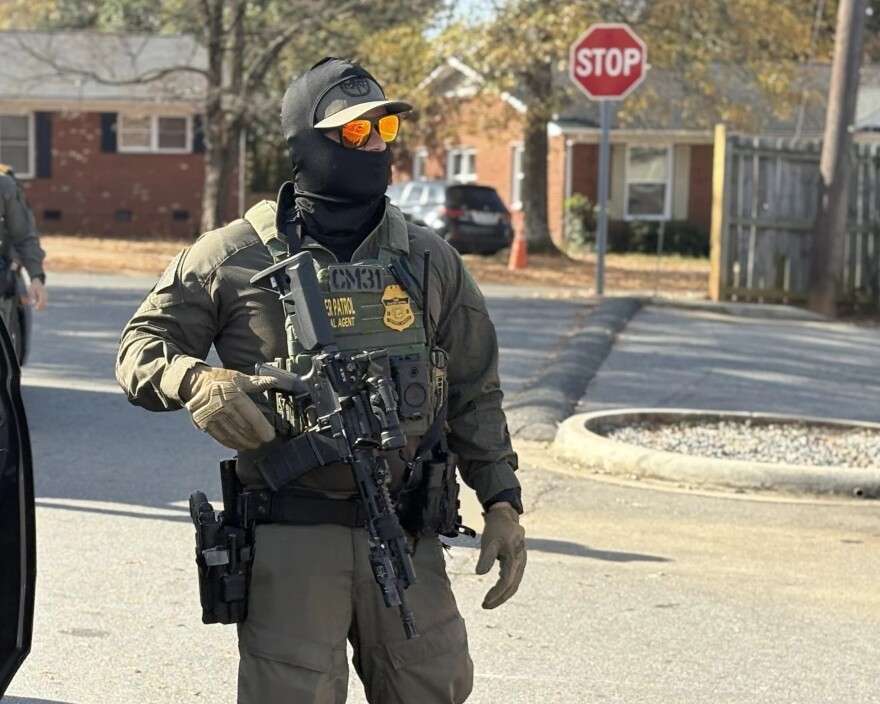U.S. Customs and Border Protection allegedly arrested more than 370 people through operation Charlotte’s Web. They have also targeted Raleigh and have been spotted in Boone and Lenoir.
Asheville Mayor Esther Manheimer has said Asheville may also be a target for CBP. The potential presence of federal immigration enforcement in Western North Carolina has caused much fear, anxiety, and questions about what a person’s rights are if they encounter a situation like that.
To help dispel some rumors and provide basic guidance about what to do if you are either targeted by immigration authorities, or if you witness someone else being targeted, BPR’s Jose Sandoval spoke with three attorneys for legal advice.
Jackie Kiger is executive director of Pisgah Legal Services; Leonel Gonzalez is an immigration attorney with Pisgah Legal Services; and Ana Nuñez is an immigration attorney at Fay Grafton Nunez. We’ve edited their responses for clarity.
Below is their advice.
What are your rights when approached by CBP or ICE (Immigrations and Customs Enforcement) in public?

Kiger: First and foremost, people do have the right to remain silent and they will need to exercise that right by verbally stating, “I'm gonna exercise my right to remain silent.”
Nuñez: The first thing you wanna do is try to identify if this person (CBP or ICE) for real. It's hard in that situation when somebody's coming up to you in the middle of the street. If you're a person that is a citizen or has lawful status here, the advice may be a little bit different for you because you may be able to provide proof that you're here lawfully.
It's a little bit easier (for citizens or legal residents) than for somebody who perhaps is undocumented. My advice to that person would be, you have the right to remain silent, you don’t have to talk to CBP, you don’t have to tell them where you’re from.
What to know if you think you are witnessing an arrest:
Nuñez: You are allowed to film here in North Carolina. One of the pieces of advice I've given folks is if you can and you're able to safely bear witness to what is going on, you can record. The one thing you cannot do is impede whatever is happening in front of you. You can't interfere with whatever law enforcement investigation is happening.
Gonzalez: Understand that if you are recording, that might escalate a situation. Prioritize your safety first. If you're recording and they ask you to stop, you can exercise your first amendment right to record whatever is happening if it's in a public area. If they ask you to stand back, record yourself taking a step back, record yourself complying.
Are you violating any laws when following ICE or CBP? What about alerting others of their presence?

Nuñez: It's tough because these situations vary from person to person. Impeding sometimes can be subjective.
One thing I explain to folks is if a CBP officer in this situation is trying to run after a person, you can't open your door and let the person in your house. That would be impeding. You're trying to essentially help this person evade law enforcement.
Officers may feel that the person is too close for comfort and they now have to pay attention to this person because they may feel like this person may harm them in some way.
What are your rights if ICE or CBP approaches your home?
Kiger: I would probably really stress to folks that first and foremost, do not consent to ICE or CBP coming into your home. If they knock on the door, keep the door locked. Ask for identification and request to know who they're asking for, what paperwork they have. If you consent to entry, then the rights that you have can be then limited after that.
Nuñez: They're going to say they have a warrant. 98% of the time it's not a judicial warrant, it is an administrative warrant, and that warrant does not allow them permission to come into your house.
What rights do business owners have when dealing with federal immigration agents?
Kiger: This is really where it can get somewhat complicated because the line between what is open to the public in terms of a place of business and what is private within that business is something that business owners should really pay attention to.
There might be a common area, like a lobby, a waiting room, or the outward facing place of the business, but then there are other rooms where it's authorized personnel only. It's really important that employers think about having a plan. Put up signage that clearly indicates what the expectations are, and then ask for documentation and request the purpose of why someone is asking to come in and what they are doing there.
What is some other advice that can be helpful for people to know?

Gonzalez: One of the best things that people in the community can do is hope for the best, but prepare for the worst. Make a plan. Collect your documents. Make sure that they're in an area that's safe.
We are recommending getting power of attorney documents. Those identify an agent and authorize them to make decisions about your property or your children in the event that you're not able to do so. Those documents can help put in place a backup plan.
Nuñez: Make sure that the people you seek advice from are actually lawyers and that you can see face-to-face that these people don't exist in the abyss.
I have tons of clients that get scammed because somebody sends them a message on Facebook or on WhatsApp and they start sending money to that person, and the person produces these fake documents. Make sure you do your research, and don't get scammed.
As of Nov. 21, there have been no further confirmed spottings of ICE or CBP in Western North Carolina.




